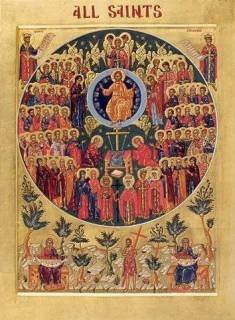Your Church throughout the world, O Lord, is clothed with the blood of Your Martyrs as with fine linens and purple robes; and so the Church cries out to You, O Christ our God: “Send down Your goodness upon Your people; grant peace to Your Church and great mercy to our souls.
 The eighth weekend after Easter, that is, the first weekend after Pentecost, recalls the memory of all saints. This weekend completes the cycle of moveable feasts. On this day our Church pays particular veneration to all those who are the fruit of the gifts of the Holy Spirit. To be a saint means to be a person who has truly recognized that God’s Spirit resides within him and directs him to live in accord with the teachings of Jesus.
The eighth weekend after Easter, that is, the first weekend after Pentecost, recalls the memory of all saints. This weekend completes the cycle of moveable feasts. On this day our Church pays particular veneration to all those who are the fruit of the gifts of the Holy Spirit. To be a saint means to be a person who has truly recognized that God’s Spirit resides within him and directs him to live in accord with the teachings of Jesus.
The veneration of the saints began with the death of the first martyrs. In later centuries the cult of the martyrs incorporated also the cult of the apostles, bishops, ascetics and religious of both sexes – all persons who we judge, from accounts of their lives, to have lived like Christ. They are people who we believe, after considering an account of their lives, lived like Jesus lived (i.e., they are people who embraced Jesus as a model of their thinking and behaving). Emperor Constantine the Great (+337) built in Constantinople a church dedicated to the memory of the saints.
Before long, the cult of the New Testament saints was extended to include persons from the Old Testament.
Our church calendar dedicates each day in the year to one or more saints or classes of saints. There are multitudes of saints in heaven whose names are not recorded in the Church Calendar.
The feast of All Martyrs was kept in the Greek Church even during the time of John Chrysostom (+407). A eulogy in their honor, delivered by him on the first Sunday after Pentecost, remains extant: Seven days had not yet passed, he says, since we celebrated the holy feast of Pentecost and once again the choir of martyrs received us, the faithful warriors and army, who do not yield to the army of angels, whom Jacob had seen, but are equally zealous and equal to them.
We commemorate All Saints as a way to profess our belief that, after death, all people are alive in God. The people we call saints, are additional models for us about how to live this life. We honor all saints because their lives indicate to us that we can, if only we believe and desire, live like Christ. Other humans did it. We can do it likewise.
O holy saints, pray for us!
